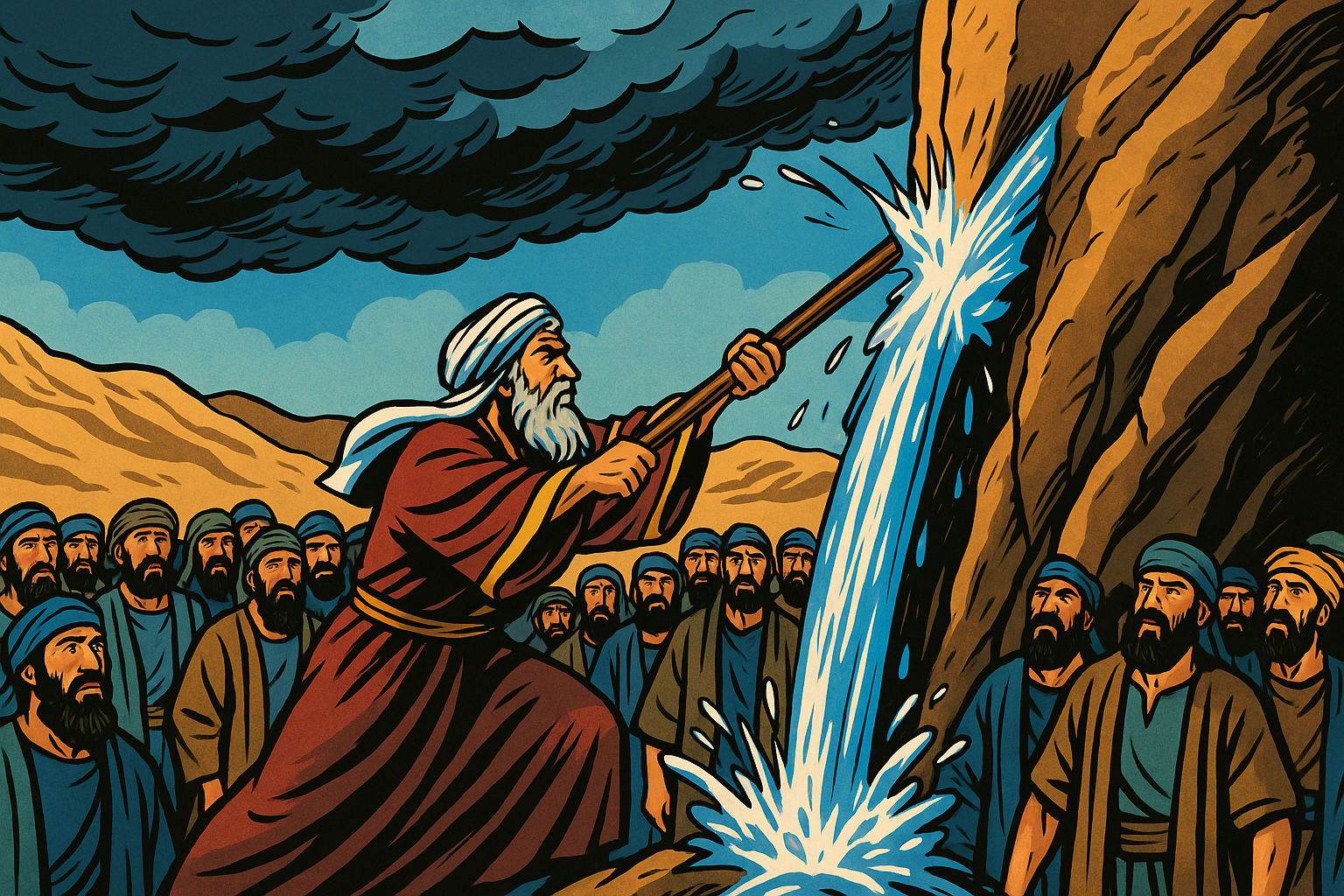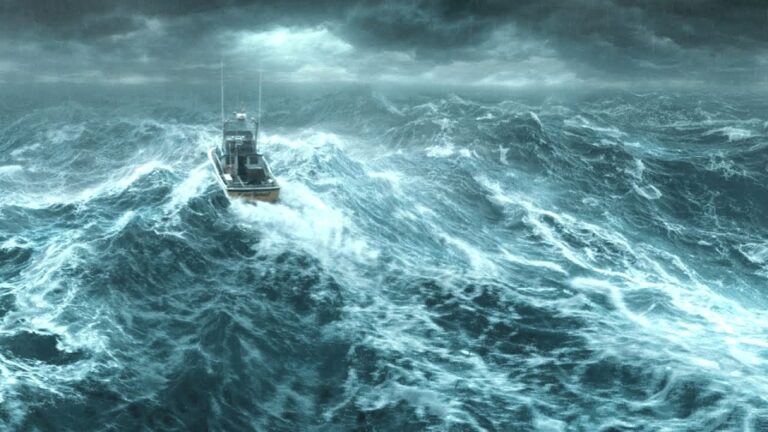Speak to the Rock Before Their Eyes

The Main Requirement for the Final Geulah
Every time Hashem wants to bring the geulah sh'leimah [גְּאוּלָּה שְׁלֵמָה, complete or ultimate redemption], He tests His people to see if they are worthy of it.
One example is in Parashat Ki Tisa when Moshe Rabbeinu received the luchot rishonot [לֻחוֹת רִאשׁוֹנוֹת, first set of tablets], carved out and written by the finger of G-d. The people only needed to wait the full forty days, and Moshe could have descended as Mashiach. But the Satan sowed confusion by showing them an image as if Moshe were dead on a bier, and they fell into despair and made the golden calf.
Another example is in Parashat Chukat. Almost thirty-eight years had passed since the episode with Korach. Since the Torah is silent about those years, it is assumed by most commentators that the nation wandered around the wilderness without any significant incident. They seem to have fallen into a good routine. There were no more complaints about the man, or about water, or about Moshe Rabbeinu and his leadership. The people prayed, learned Torah, and worked on fixing themselves to regain what they had lost in the early years after they came out from Egypt.
However, like a lightning bolt from the sky, that idyllic routine was shattered (Bemidbar 20:1): וַיָּבֹאוּ בְנֵי־יִשְׂרָאֵל כׇּל־הָעֵדָה מִדְבַּר־צִן בַּחֹדֶשׁ הָרִאשׁוֹן וַיֵּשֶׁב הָעָם בְּקָדֵשׁ וַתָּמׇת שָׁם מִרְיָם וַתִּקָּבֵר שָׁם (And B'nei Yisrael, the whole congregation, came to the Desert of Tzin, in the first month, and the people dwelt in Kadesh, and Miriam died there and was buried there). The Matriarch of the Jewish People, elder sister of Moshe and Aharon, who as a child had challenged the holy Sages, protected Moshe with her life, stood up to Pharaoh and saved the baby boys, led the women in song at the crossing of the Yam Suf, and in whose merit the people drank water throughout the wilderness years—suddenly and unexpectedly passed away.
Her passing provided the impetus for the final opportunity during the wilderness years, to repair all of the sins of the past and merit the geulah sh'leimah.
Immediately after her passing, it is written in the Torah (Bemidbar 20:2): וְלֹא־הָיָה מַיִם לָעֵדָה וַיִּקָּהֲלוּ עַל־מֹשֶׁה וְעַל־אַהֲרֹן׃ (And there wasn't any water for the congregation, and they assembled against Moshe and Aharon). As Rashi says: מִכָּאן שֶׁכָּל אַרְבָּעִים שָׁנָה הָיָה לָהֶם הַבְּאֵר בִּזְכוּת מִרְיָם (From here, [we learn] that all forty years they had the well [be'er] in the merit of Miriam). This complements the words of R' Yosi the son of R' Yehudah (Ta'anit 9a): וְשָׁלֹשׁ מַתָּנוֹת טוֹבוֹת נִיתְּנוּ עַל יָדָם וְאֵלּוּ הֵן: בְּאֵר וְעָנָן וּמָן. בְּאֵר בִּזְכוּת מִרְיָם, עַמּוּד עָנָן בִּזְכוּת אַהֲרֹן, מָן בִּזְכוּת מֹשֶׁה (And three good gifts were given through them [Moshe, Aharon, and Miriam], and these are they: the be'er, and the cloud and the man. The be'er, in the merit of Miriam, the cloud in the merit of Aharon, and the man in the merit of Moshe).
To understand how this episode was a test for the geulah sh'leimah, we need to explore the deeper meaning of the Be'er of Miriam.
Miriam's soul was unique in this world, and on a certain level served as the counterpart to the soul of Moshe Rabbeinu. R' Nachman of Breslov teaches (Likutei Moharan 20:1): דַּע שֶׁיֵּשׁ נְשָׁמָה בָּעוֹלָם שֶׁעַל־יָדָהּ נִתְגַּלֶּה בֵּאוּרֵי וּפֵרוּשֵׁי הַתּוֹרָה וְהִיא מְסֻבֶּלֶת בְּיִסּוּרִין…וְכָל מְפָרְשֵׁי הַתּוֹרָה הֵן מְקַבְּלִין מִזֹּאת הַנְּשָׁמָה (Know that there is a soul in the world, through which the elucidations and interpretations of the Torah are revealed, and it is burdened with suffering…and all those who interpret the Torah receive from this soul). R’ Nachman’s words reveal a profound teaching: when he said ‘all,’ he meant literally everyone—even Moshe Rabbeinu. For Moshe’s merit brought the man, representing the Written Torah [תּוֹרָה שֶׁבִּכְתָב, Torah she'bichtav], which is associated with the sefirah of tiferet. Likewise, Miriam’s merit brought the be’er, representing the Oral Torah [תּוֹרָה שֶׁבְּעַל פֶּה, Torah she'be'al peh], which is associated with the sefirah of malchut. Therefore, even Moshe Rabbeinu had to draw insight from Miriam’s soul, through the Shechinah itself, to explain and apply Torah she’bichtav in daily life.
R' Nachman goes on to explain that just as Yirmeyahu ha-Navi revealed that Hashem's words, Torah she'bichtav, are like fire (Yirmeyahu 23:29), so too, the words of Torah she'be'al peh that emanate from this holy soul are like coals of fire. But just like physical coals can cool off when the flames diminish, so too the spiritual coals of fire can cool off as well. Indeed, this is exactly what happened when B'nei Yisrael came to the Wilderness of Tzin[צִן]—from the word מְצֻנָּן, meaning cooled off or chilled. Although the pasuk tells us that Miriam died as soon as they got to the Wilderness of Tzin, it does not reveal cause and effect—whether the cooling led to Miriam’s passing or vice versa. Either way, the events are intimately linked.
We should now comprehend the ramifications of Miriam's passing. It wasn't just that the be'er dried up and there was no water to drink. Yes, on a physical level, this is exactly what happened. But on a deeper level, the wellsprings of Torah she'be'al peh dried up. In the words of R' Nachman: וּכְשֶׁנִּסְתַּלֶּקֶת, אֲזַי נִסְתַּלֵּק בֵּאוּרֵי הַתּוֹרָה הַנִּמְשֶׁכֶת עַל־יָדָהּ, וַאֲזַי כָּל מְפָרְשֵׁי הַתּוֹרָה אֵין יְכוֹלִין לְהַשִּׂיג שׁוּם בֵּאוּר הַתּוֹרָה (And when it [i.e. the soul] departs, then the elucidations of the Torah which are drawn down from it depart, and then all those who expound the Torah aren't able to comprehend any elucidation of the Torah). To more fully appreciate the source of this chiddush, note that the word for well, i.e. be'er [בְּאֵר], is related to the word for elucidation, i.e. be'ur [בֵּאוּר]. They are one and the same aspect. Therefore, when Miriam's be'er dried up, the elucidations of the Torah dried up. To say that Miriam's passing presented B'nei Yisrael with an existential crisis would be putting it mildly. The whole nation went into full-blown panic because they could no longer expound or elucidate any of the Torah!
And so, because they could no longer comprehend Torah explanations, quarrels and controversies erupted, particularly against the tzaddikim. As stated by R' Nachman: וְאָז נִתְעוֹרֵר מְרִיבָה עַל הַצַּדִּיקִים כִּי עִקַּר הַמַּחֲלֹקֶת שֶׁבָּעוֹלָם נַעֲשֶׂה עַל־יְדֵי הִסְתַּלְּקוּת בֵּאוּרֵי הַתּוֹרָה כִּי הַבֵּאוּר הוּא תֵּרוּץ עַל קֻשְׁיוֹת וּמְרִיבוֹת (And then strife arises against the tzaddikim, for the essence of controversy in the world comes about through the departure of the elucidations of the Torah, for elucidation is an answer to questions and disputes). Indeed, this is exactly what happened next (Bemidbar 20:3): וַיָּרֶב הָעָם עִם־מֹשֶׁה (And the people quarreled with Moshe).
Now even though the people started up with Moshe Rabbeinu, Hashem was merciful and gave Moshe a specific set of instructions, that if he had followed them exactly, would have ended the controversy—the machloket—reopened the wellsprings of Torah she'be'al peh, unified the nation, and brought about the geulah sh'leimah (Bemidbar 20:8): קַח אֶת־הַמַּטֶּה וְהַקְהֵל אֶת־הָעֵדָה אַתָּה וְאַהֲרֹן אָחִיךָ וְדִבַּרְתֶּם אֶל־הַסֶּלַע לְעֵינֵיהֶם (Take the staff and assemble the congregation, you and Aharon your brother, and speak to the rock before their eyes).
We know what happened. Moshe took his staff—as he was commanded—and gathered the people—as he was commanded—but he did not speak to the rock. Rather, he spoke to the people and hit the rock—twice. Before we dissect Moshe's actions, let's first focus on Hashem's instructions. What did He really want Moshe to do? What were the instructions designed to accomplish?
Simply put, Hashem wanted Moshe Rabbeinu to use his staff, i.e. representing his authority as the spiritual leader of the nation, to gather the people together in order to pray with them—to beseech Hashem as one unified nation, pouring out its heart to Hashem, to the 'Rock,' to reopen the be'er of Miriam! How do we know this? R' Nachman explains the end of the pasuk quoted above: וְדִבַּרְתָּ אֶל הַסֶּלַע לְעֵינֵיהֶם – אֵין דִּבּוּר אֶלָּא נַחַת (שבת סג.), שֶׁיִּשְׁפֹּךְ שִׂיחוֹ וּתְפִלָּתוֹ בְּתַחֲנוּנִים כְּדַל וּכְרָשׁ. אֶל הַסֶּלַע, הַיְנוּ לֵב הָעֶלְיוֹן כַּנַּ"ל, לְעֵינֵיהֶם – דַּיְקָא, שֶׁיִּהְיֶה הַקָּהָל בִּשְׁעַת מַעֲשֶׂה, כְּדֵי שֶׁיְּקַשֵּׁר אֶת עַצְמוֹ עִם נִשְׁמָתָם כַּנַּ"ל ('And speak [v'dibarta] to the rock before their eyes'—'dibbur means nothing but calm' [Shabbat 63a], i.e. that he should pour out his conversation and his tefillah with supplication, like a pauper and destitute person, 'to the Rock'—i.e. the Supernal Heart—'before their eyes'—specifically, that the assembly should be present at the time of the action, so that he may connect himself with their souls).
But that's not what happened. Instead of using the staff, which represented his own merit, to gather the assembly, he used it to strike the Rock. In the words of R' Nachman: שֶׁזָּכַר טוּבוֹ וְצִדְקָתוֹ בִּשְׁעַת תְּפִלָּתוֹ, שֶׁלֹּא הִשְׁתַּמֵּשׁ עִם הַמַּטֶּה בִּשְׁבִיל הַקָּהָל, אֶלָּא הִשְׁתַּמֵּשׁ עִם הַמַּטֶּה בִּשְׁעַת תְּפִלָּתוֹ (That he recalled his goodness and his righteousness at the time of his tefillah, that he did not use the staff for the sake of the assembly, rather he made use of the staff at the time of his prayer). Why did he do this? R' Natan of Nemirov explains in Likutei Halachot that he got upset (Hilchot Gezeilah 5:5): רַק בְּעֵת הַכָּאַת הַצּוּר בִּלְבְּלוּ אוֹתוֹ הַמִּתְנַגְּדִים וְהַחוֹלְקִים עַד שֶׁבָּא לִידֵי טָעוּת (Rather, at the time of striking the rock, the opponents and disputants confused him until he came to making a mistake).
That's why a later pasuk says (Bemidbar 20:10): וַיָּרֶם מֹשֶׁה אֶת־יָדוֹ וַיַּךְ אֶת־הַסֶּלַע (And Moshe raised his hand and struck the rock). What is the deeper meaning of raising his hand? It is reminiscent of what he did when Yisrael fought against Amalek at the Battle of Rephidim (Shemot 17:11): וְהָיָה כַּאֲשֶׁר יָרִים מֹשֶׁה יָדוֹ (And it happened that when Moshe raised his hand…). In Shemot 17:12, Targum Onkelos explains this as פְּרִיסָן בִּצְלוֹ (spread out in prayer). We see, therefore, that Moshe raised his hand in prayer—by himself, without joining himself to the entire assembly—and through his own merits demanded, i.e. the deeper meaning of 'striking', of Hashem that He reopen the be'er.
Yet, even though Moshe disregarded a direct command of Hashem, the amazing part is that He had such compassion and pity on the nation that He reopened the be'er nevertheless—not as a free gift, which was His intent, but in the merit of Moshe (and Aharon), as it is stated in Ta'anit 9a: וְחָזְרָה בִּזְכוּת שְׁנֵיהֶן (And it returned in the merit of them both).
This understanding explains how Hashem could say in Bemidbar 20:12: יַעַן לֹא־הֶאֱמַנְתֶּם בִּי (Because you didn't believe [i.e. have emunah in] Me). Moshe didn't believe in Hashem? What is that supposed to mean? R' Nachman explains: שֶׁהֵרִים תְּפִלָּתוֹ מִתְּפִלַּת הַקָּהָל, שֶׁלֹּא קָשַׁר אֶת עַצְמוֹ עִם הַקָּהָל. וְהַתְּפִלָּה הִיא אֱמוּנָה, כְּמוֹ: וַיְהִי יָדָיו אֱמוּנָה (That he raised his tefillah above the tefillah of the assembly, in that he did not bind himself with the assembly. And tefillah is [an expression of] emunah, as in [Shemot 17:12]: 'and his hands were emunah'). Indeed, since there was no public tefillah, there was no sanctification of Hashem, as it says (Tehillim 22:4): וְאַתָּה קָדוֹשׁ יוֹשֵׁב תְּהִלּוֹת יִשְׂרָאֵל (And You are kadosh, [when] You sit [i.e. are enthroned upon] the praises of Yisrael). And this explains why Hashem went on to say (Bemidbar 20:12): יַעַן לֹא־הֶאֱמַנְתֶּם בִּי לְהַקְדִּישֵׁנִי לְעֵינֵי בְּנֵי יִשְׂרָאֵל (Because you didn't believe Me to sanctify Me in the eyes of B'nei Yisrael). What a tragedy—yet, there was compassion in the midst of tragedy.
Sometimes what seems like a setback—such as the passing of Miriam and the drying up of the be'er—is not a punishment, but a hidden opportunity for the generation to rise to the challenge and bring about the geulah sh’leimah. Had Moshe Rabbeinu gathered the nation for unified prayer and bound his tefillah with theirs in humility and supplication to the Rock of Israel, as Hashem commanded, the wellsprings of Torah would have reopened as a free gift, the prophecy of Eldad and Meidad would have been nullified, Moshe would have led the people into the Land as Mashiach, and the Beit ha-Mikdash of fire would have been established.
This teaches us a crucial lesson: whenever we long for the geulah, our tefillah must not be in isolation or based on our own merits. Rather, it must be joined with the tefillah of Klal Yisrael, bound to the tefillah of the Tzaddik—the one who carries within him the soul of Moshe Rabbeinu in each generation—through whom the wellsprings of Torah are drawn down anew.
Only through this deep unification of hearts and prayers can we merit the geulah sh’leimah.




![Blood [is] Money](https://www.theshoemakerreport.com/wp-content/uploads/2025/02/doctor.healer-768x429.jpeg)

